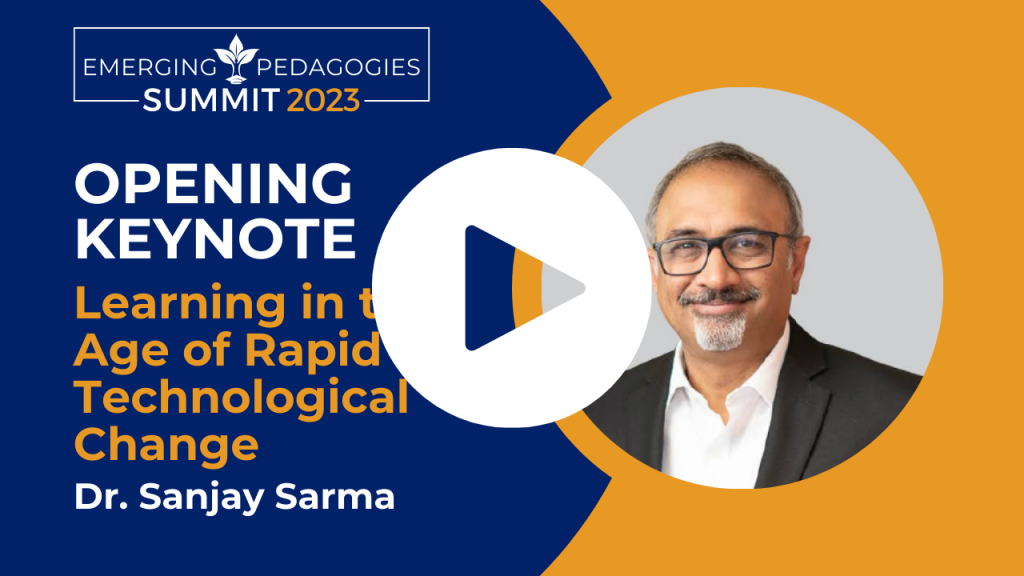In early October, Learning Innovation hosted the inaugural Emerging Pedagogies Summit for Duke faculty and staff invested in teaching and learning. The Summit’s goal was to promote ongoing conversations about the future of education in hopes of shaping a future vision of pedagogy. In this blog series, we will revisit each session to reflect on the lessons shared by the presenters and envision how these emerging pedagogies may take root at Duke.
In October, we opened the 2023 Emerging Pedagogies Summit with an engaging, information packed keynote address from Sanjay Sarma. Sarma is CEO, President and Dean of the Asia School of Business, and a Professor of Mechanical Engineering at the Sloan School of Management at MIT. View his keynote below:

Sarma began with the observation that we are currently in a period of rapid change; in society, with the climate, in the political world. These whirlwind changes are leading to rapid obsolescence of knowledge. Essentially, “what you knew five years ago may not be as valuable today.” Sarma asks, “Is the education industry ready for this?”
Education, noted Sarma, hasn’t changed much in thousands of years. Many modern educational experiences are still lecture-based, which science tells us is far from the most effective way to teach students. So, as we acknowledge the need to constantly grasp more and more new information as the world changes around us at a faster and faster rate, how can we improve education in order to make this process more effective and efficient?
Sarma cites a number of research-revealed facts about how students learn:
- Students’ minds naturally wander every few minutes. After about 10 minutes of learning, the brain struggles to maintain active attention as it shifts more toward “digesting” information.
- There is a measurably higher rate of learning among students who are asked to stop every few minutes to answer questions about content that they are learning. Comprehension and retrieval of information leads to much higher rates of long term retention.
- Students benefit from “spaced retrieval.” The brain is built to clear space of unused information. When students are exposed to, or asked to recall, information repeatedly, the brain subsequently holds on to that information for longer with each repetition.
- Students display better retention of information that they have learned slowly over time and had an opportunity to practice.
- If students learn something, then act it out or represent it physically, they understand and retain that information better.
- More dopamine is present in the brain, and better learning subsequently occurs, when students are curious. Using classroom time to have students DO things rather than absorb content is potentially a more effective use of that time.
Sarma suggests that, in light of this information, instructors should be encouraged to consider reserving classroom time for activities focused on context and intent, curiosity-building, coaching, and hands-on experience. Less engaging elements like lecture, practice, and spaced repetition can be moved online (or at least out of the classroom) in order to allow this to happen.
Duke Learning Innovation’s mission is to help Duke students learn more, and to help more people learn from Duke. If you’d like to speak with someone about how to apply Sarma’s recommendations, or to reconsider your pedagogical approach in any way, you may contact us at any time. We will connect you with one of our consultants, who have advanced knowledge of pedagogy and technology, significant experience in college teaching, and subject area expertise in multiple disciplines. We can help you try new ideas, address teaching and learning challenges and create approaches that improve your experience as an instructor and enhance student learning.
Aria Chernik, one of the Emerging Pedagogies Summit presenters, encouraged her Building Next Generation Learning students to attend and share their thoughts on what they heard at the Summit. The following reflections are excerpts from their original submissions.
“The speaker mentioned various findings and theories in psychology and neuroscience — very exciting to me, since that is what I am studying — that is related to learning, yet hardly applied in a meaningful way. Ebbinghaus forgetting curve, for example, is one of the few principles that is beginning to be acknowledged. In my own experience, knowledge about the forgetting curve and a conscious goal to stay ahead of that curve has been very helpful in vocabulary learning and retrieval practices in many courses. On the other hand, spaced and incremental learning is an example of a theory that is not the norm in college classes. Research found that we retain material for longer if we slowly build up the learning, instead of quickly trying to learn many things, but the latter is exactly how university courses are structured.
Sarma’s substantial experience in leading learning innovation initiatives is evident in his optimistic yet clear-eyed outlook on the future. For instance, when asked about his opinion on assessment of learning in a new model, he explains that he does not advocate for the abolition of all assessments, merely the mechanistic ones that do more harm than good for learning.” – Katherine Zhong
